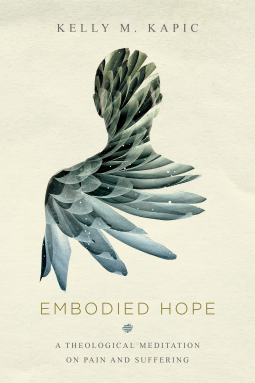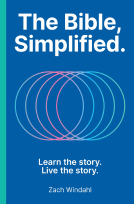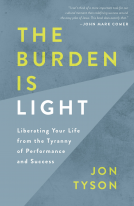
Embodied Hope
A Theological Meditation on Pain and Suffering
by Kelly M. Kapic
This title was previously available on NetGalley and is now archived.
Send NetGalley books directly to your Kindle or Kindle app
1
To read on a Kindle or Kindle app, please add kindle@netgalley.com as an approved email address to receive files in your Amazon account. Click here for step-by-step instructions.
2
Also find your Kindle email address within your Amazon account, and enter it here.
Pub Date Jun 05 2017 | Archive Date Jun 14 2017
InterVarsity Press | IVP Academic
Description
Too often the Christian approach to suffering is shallow and detached, viewing it as a puzzle or game.
But in this book, Kelly Kapic draws on his own family's experience with prolonged physical pain to reshape our understanding of suffering into the image of Jesus,
Hope can be found in the depth of pain only because Jesus took on our embodied
existence, suffered alongside us, died, and rose again. And as we look to Jesus, we are invited to participate not only in his
sufferings, but also in the church, calling us out of isolation and
into the encouragement of the communal life of Christ.
Advance Praise
"I am all too familiar with the topic of this book, having lived as a quadriplegic for nearly fifty years and dealing daily with chronic pain. So I'm always heartened when I stumble upon a rich new resource that really encourages. That describes the remarkable book you hold in your hands. Rather than focus on why, Kelly makes much of how—how to trust God in this world. Best of all, Embodied Hope leads the reader to the foot of the cross, the only place to find true relief and healing. I love this book!"
—Joni Eareckson Tada, founder and CEO, Joni and Friends International Disability Center
"Here is a rare gift of love to the Christian church—especially for sufferers, their watchers, and all who observe deep pain. Kelly Kapic combines love for Scripture, familiarity with the spiritual masters of the past (Athanasius, Luther, and John Owen, to name but a few), and friendship with contemporary sufferers, together with a gracious sensitivity to the sometimes inscrutable wisdom of God. Kapic's reliable and gently applied theology, married as it is to personal experience, offers exactly what the title suggests: embodied hope."
—Sinclair Ferguson, teaching fellow, Ligonier Ministries, author of Deserted by God?
"Out of Kapic's own encounter with pain has come a book that reflects deeply on the theological challenges it poses. As a theological meditation, it helps sufferers dispel distorted images of God and gently nudges them to engage in consideration of God's full identification with us in the incarnate Christ to find an existential answer to an existential problem. Pastors ministering to people facing the enigma of suffering will find here a resource that is at once theologically robust and pastorally sensitive."
—Simon Chan, Trinity Theological College, Singapore
Available Editions
| EDITION | Paperback |
| ISBN | 9780830851799 |
| PRICE | $18.00 (USD) |
| PAGES | 192 |
Average rating from 5 members
Featured Reviews
An indepth and profound exploration of how God meets us in the darkness of suffering and loss. A resource rich in theological and practical detail on how to love, care and walk with others through their pain-filled world. God is raised high as the root source of 'theological instinct' and brought low to stand with us via 'pastoral care' -- two of the main principles presented in this book.
I'll just come out and say that this is truly a tremendous effort on the part of Dr. Kapic to face, analyze and provide, not solutions - but advice on what C.S. Lewis referred to as the "problem of pain" - in it's many forms. Through actual accounts of afflicted loved ones and friends, Dr. Kapic attempts to work out difficult equations of physical and emotional burdens using solid biblical variables. This book empowers a church and the individual, not to romanticize pain with stock phrases of purpose and hope, that ultimately disconnect us from God, but to:
-confess the complexity of pain
-accept it as part of this fallen world
-learn to live in the presence of it
and allow us to teach us more about God and develop a stronger relationship with Him, through His Son.
'Embodied Hope' calls the believer to grieve, lament, wrestle amid the pain/challenges and maintain confidence in God throughout.
 Kenson G, Reviewer
Kenson G, Reviewer
We all know pain and suffering differently. Physical or emotional, pain always leads us to feel anguish, loneliness and discouragement. What should Christians think about suffering? Should we just accept it or what can we do? Kapic, writes this work, from a personal and experiential perspective, considering what the Scriptures teach us, as well as other good writings.
This is a good book, which should be read by those who are suffering. Also this book, should be read by those who see God as guilty of their sufferings.
The book consists of 3 parts:
Part 1: The Struggle
In this part the author talks about the pain and the thoughts that arise concerning God. There are questions, there is anguish, and where is God?
Part 2: The strangeness of God
In this part of the book, Kapic tells us about the incarnation, the importance of recognizing that Christ was as one of us. Not only that, but it is one with us.
Part 3: Life together
In the last part, the author talks about the importance of communion among believers to face the pain.
There are 13 chapters that will be of inspiration, comfort and help for many.
Personally this book helped me a lot, since I have seen many family members suffering from illness or pain. And what great consolation are these books that do not tell us about "how to overcome the pain in 24 hours", but they tell us about pain in a theological and experiential way.
Thanks to IVP for the copy of this book.
First sentence: This book will make no attempt to defend God. I will not try to justify God or explain away the physical suffering in this world. Instead, I wrestle with nagging questions about our lives, our purpose, and our struggles. How should we live in the midst of this pain-soaked world? How do we relate to the God whose world this is? If you are looking for a book that boasts triumphantly of conquest over a great enemy or gives a detached philosophical analysis that neatly solves an absorbing problem, this isn’t it. Instead, this book aims to invites you into a larger conversation, a conversation greater than my family, and a struggle bigger than your pain and doubt. For while our pain, or the suffering of those we love, may cause us to feel isolated, these challenges remind us that we are actually part of the much larger stream of humanity.
Premise/plot: Embodied Hope is a Christian book about pain--chronic physical pain to be exact. It is divided into three parts: "The Struggle," "The Strangeness of God," and "Life Together."
The premise is simple: "Physical suffering often affects how we relate to God and others….The condition of our bodies does influence how we understand God and his ways….Pain in our body often influences how we relate to others." Kapic writes, "We must not pit the body against the spirit, the mind against the heart, the individual against the community. For our struggle is not ultimately with a single side of suffering but with how it affects us in our totality: from our relationships to our faith, from our bodies to our hope, from our mourning to our love."
Kapic examines the subject of pain in the world in this world. How pain impacts the individual, the family unit, the church community, and to a very small extent society itself. It isn't necessarily a theological book on "the problem of evil" vs. "the goodness of God." I don't think it would be a stretch to say that Kapic seeks to avoid the general and abstract in favor of the intimate and personal. In fact, he writes, "Rightly understood, doing theology is more often like farming than it is like stacking doctrinal bricks. Theology is lived; it is not regimentally constructed….Only when we begin to see that theology is not merely about repeating back answers but instead more like caring for a garden can we care well for others….There is a world of difference between reading a book about caring for people and actually caring for people. To theologize well, we need to love well."
The truth of the matter is that every person is unique. Every person has his or her own way of dealing with the pain, of coping with the pain, of living with the pain. And as much as he tries not to make generalizations, I think a few slip in.
In the first part, he explores "the struggle" of living with pain and the theological implications. He assumes that pain leads most to have "hard thoughts" about God. He assumes that most pain sufferers have false notions of God. For example, they see him as angry, distant, cruel, harsh; someone who enjoys watching people suffer. Pain sufferers might conclude that God isn't good and merciful and kind.
Kapic writes, "How does God look upon us in our weakness, even in our sin? Is God really angry or wrathful with us, his children? His bride? What picture of God is really warranted by the Scriptures? How do these passages like Zephaniah 3:17 and Isaiah 62:5 intersect our own experience? How can we then deal with the “hard thoughts” that tempt us, especially in our suffering? How do we develop a profound and affectionate trust of God rather than a sense of alienation? Our journey is to learn why such hard thoughts don’t reflect the triune God. Our hope is to learn to hear him singing over us, to trust his presence in the middle of the pain. Some will immediately object that this is wishful thinking based on a few obscure verses here and there. However, we will see that we are not talking about a few scattered biblical texts but are diving into the heart of the gospel, the heart of the good news discovered in Messiah. Only here will we unquestionably discover the very heart of God. To understand God and his relationship to our pain, we will need to examine the case of Jesus of Nazareth, a man who walked the dusty roads of Galilee over two thousand years ago. Only by listening to his words and by following the movement of his life, death, resurrection, and ascension might our very human struggle be seen in different light. Because he was and is God’s revelation of himself to us, it only makes sense to start there. In this endeavor it is to be hoped that our view of the God of heaven and earth will deepen beyond our current understanding. But to see Jesus clearly we need to stop defending our preconceived notions of who God is."
In the second part, the focus shifts to the life, death, and resurrection of Jesus Christ our Lord and Savior.
In the third part, the focus shifts to the church, to the community of believers. How can the church of God best care for the people of God? How can the church reach out, include, better understand those living and struggling with physical pain and suffering?
I found the tenth chapter the most thought-provoking. In this chapter, he discusses the importance of confessing our sins to one another. This isn't a subject that is addressed often in contemporary theology. So he gave me a lot to think about!











